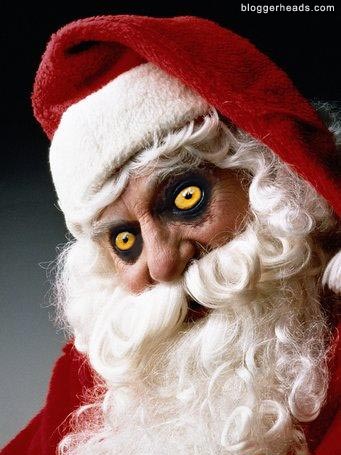The Empire of Claus December 26, 2012
Author: Beach Combing | in : Contemporary, Modern , trackbackWho is the ruler of Christmas? Santa Claus, of course. But the red bearded one has climbed over a lot of dead bodies to get to where he is today. And every so often when you travel around western countries you find traces of Christmases past. In Spain, for example, and, indeed, through much of the Spanish-speaking world, there is the festival of the ‘Three Kings’, on epiphany (6 December). Their Majesties traditionally travelled around cities giving children presents and sweets. Naturally, post Franco, the thuggish Claus arrived in Spain and the three kings have been given relatively short shrift. Some Spanish families no longer even celebrate what used to be the happiest day for Spanish youngsters.
With the three kings there is a minimum of Christian justification as the magi (aka the wise men) do bring gifts to the baby messiah in the Gospel Matthew. But what about the Italian equivalent, the Befana, a gloomy looking witch who comes, also on Epiphany and brings with her presents? She shoots down chimneys leaving these for good girls and boys and then heads back off to her forest retreat.
The poor old Befana has had a good deal to put up with. Not only has she been outflanked by the evil Claus, whose 25 December festival is so much better for children in term of timing: if little boys and girls have to wait till 6 Jan the holidays are practically over. The Befana was also politicised. Under Fascism the haggish one was seen as an ‘indigenous’ answer to the horrors of internationalised, capitalist Christmases and she was feted to the high heavens. The Italian government would also give out gifts to small children on her festival. The result is that today the very act of celebrating the Befana can be misunderstood.
Other rivals to SC have included St Basil, who used to come to children and leave gifts in their shoes in Greece, 1 January. St Basil’s day is still celebrated and St Basil holds his own against the Santa Claus, at least for now in Greece… He is perhaps one of the last acts of successful resistance against Claus’s dominion.
‘Boxing Day’ as it is knows in Britain and the Dominions seems to have its roots in giving boxes with gifts of money. Its most endearing feature was that it had no mythic or half Christianised figure presiding over it. Rather the day was all about the dosh. How refreshingly honest!
A final rival to Claus is St Nicholas who gives gifts on 6 December and is still celebrated in some European countries including Holland and Albania. Of course, pedants would claim that Santa Claus and St Nicholas are one and the same, which is true in a purely philological sense. Sint Nikolaas becomes Sinterklaas which became Santa Claus. But true celebrants of Nicholas still look to 6 December as his feast day: those who have gone over to the dark Claus wait till 25 December before bending the deer before his snorting reindeer.
Beach wishes all his readers a happy Christmas and would be interested in any other pretenders to the Christmas throne: drbeachcombing AT yahoo DOT com Sorry for the humbugging.
***
31 Dec 2012: Filip writes in ‘Here, in Poland, it is “Święty Mikołaj” (= “Saint Nicholas”) that gives children presents at Christmas (presents are opened in the evening of December 24, to be precise). Well, in _most_ parts of Poland, because in Greater Poland (in particular in Poznań, the city where I was born and where I live) and in some other regions of Poland gifts are given by “Gwiazdor” (= “Starman”). Nowadays, Gwiazdor looks more and more like Santa Claus (a red coat, white cuffs, etc.), but the correct dress code for Gwiazdors was: sheepskin coat, fur hat, face smeared with soot. A Gwiazdor (I mean, an uncle or a neighbour disguised as a Gwiazdor) would often bring his presents in person… Well, if a kid was good and passed an “exam” on prayers and traditional Christmas songs. Otherwise, a Gwiazdor would bring rods. That’s the way it was in my childhood (1980s). Gwiazdor hasn’t surrendered to Santa Claus yet and many inhabitants of Greater Poland are eager to defend the tradition. By the way, one of the pro-Gwiazdor arguments is that it doesn’t make sense for Saint Nicholas to come to children twice (6 December is celebrated in Poland as well, the gifts are more modest than at Christmas). Russians have their “Дед Мороз” (“Ded Moroz”, “Father Frost”). During the Communist regime, the authorities were trying to implant Ded Moroz in Poland (there were some anti-religious motives behind that), to no avail. If you can read Polish, you can find funny articles in the contemporary newspapers scanned by Polish digital libraries, for example take a look at this one: (see the last page). Just one sentence for you: „Dziadek Mróz” był i w Związku Radzieckim i widział szczęśliwy śmiech dzieci w kraju, gdzie żyje Stalin (“Father Frost” was in Soviet Union as well and he saw children’s happy laughter in the country where Stalin lives)’ Thanks Filip!



